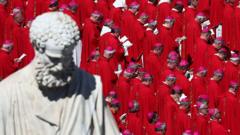In a world of press scrutiny and external influences, the upcoming conclave seeks to maintain absolute secrecy for the election of the next pope.
**Conclave Unveiled: The Sacred Secrets of Papal Selection**

**Conclave Unveiled: The Sacred Secrets of Papal Selection**
As 133 cardinals prepare for a covert conclave, the Vatican steps up security measures to ensure a sacred and secretive election.
In a matter of days, over 130 cardinals will gather in the iconic Sistine Chapel to engage in a profound yet secretive election process: the selection of a new pope destined to lead the global Catholic Church. The conclave, shrouded in mystery, demands that all participants, including the cardinals and Vatican staff, swear an oath of "absolute and perpetual secrecy," a commitment they will hold for life.
To enforce this vow, the Vatican meticulously prepares; electronic jammers are installed to prevent any unauthorized signals, and the premises are thoroughly searched for listening devices. This is not solely about confidentiality; the lockdown also protects the cardinals from potential disruptions or manipulations during what many categorize as a divinely guided decision-making process.
Upon entering the conclave, all attendees surrender their electronic devices, ensuring complete isolation from the outside world. Monsignor Paolo de Nicolo, past head of the Papal household, emphasizes the lack of external media influence, stating, "There are no televisions, newspapers, or radios" within the conclave's vicinity. The strict rules are patrolled by the Vatican's police force, underscoring the gravity of their commitment, as breaches could result in excommunication.
Leading up to the conclave, a frenzy of speculation has ignited among the media, with reporters engaging in what they call "cardinal hunting," attempting to glean insights from the cardinals seen around the Vatican. Despite the official silence enforced on the cardinals, journalists are relentless, seeking clues about alliances and preferences that could hint at the papal successor.
While the moment of voting is wholly cut off from outside interference, the prelude witnesses a flurry of activity as speculations emerge about frontrunners for the papacy. The Vatican's atmosphere is charged with the understanding that, although the decision is framed as a spiritual one, it inevitably influences a vast and complex institution involved in global issues such as conflict resolution and social justice.
As the cardinals prepare to enter the conclave, expectations are that their personal convictions will guide their decisions more than external political pressures. The discussions among them, shrouded in secrecy, remain paramount. Ines San Martin, from the Pontifical Mission Societies, notes that many cardinals are voicing their perspectives with sincerity, and the outcome of their deliberations remains uncertain and exciting.
The anticipated moment draws near, where the decision of the next pope will not only reshape the Catholic Church but also resonate beyond the Vatican, influencing the lives of millions.
To enforce this vow, the Vatican meticulously prepares; electronic jammers are installed to prevent any unauthorized signals, and the premises are thoroughly searched for listening devices. This is not solely about confidentiality; the lockdown also protects the cardinals from potential disruptions or manipulations during what many categorize as a divinely guided decision-making process.
Upon entering the conclave, all attendees surrender their electronic devices, ensuring complete isolation from the outside world. Monsignor Paolo de Nicolo, past head of the Papal household, emphasizes the lack of external media influence, stating, "There are no televisions, newspapers, or radios" within the conclave's vicinity. The strict rules are patrolled by the Vatican's police force, underscoring the gravity of their commitment, as breaches could result in excommunication.
Leading up to the conclave, a frenzy of speculation has ignited among the media, with reporters engaging in what they call "cardinal hunting," attempting to glean insights from the cardinals seen around the Vatican. Despite the official silence enforced on the cardinals, journalists are relentless, seeking clues about alliances and preferences that could hint at the papal successor.
While the moment of voting is wholly cut off from outside interference, the prelude witnesses a flurry of activity as speculations emerge about frontrunners for the papacy. The Vatican's atmosphere is charged with the understanding that, although the decision is framed as a spiritual one, it inevitably influences a vast and complex institution involved in global issues such as conflict resolution and social justice.
As the cardinals prepare to enter the conclave, expectations are that their personal convictions will guide their decisions more than external political pressures. The discussions among them, shrouded in secrecy, remain paramount. Ines San Martin, from the Pontifical Mission Societies, notes that many cardinals are voicing their perspectives with sincerity, and the outcome of their deliberations remains uncertain and exciting.
The anticipated moment draws near, where the decision of the next pope will not only reshape the Catholic Church but also resonate beyond the Vatican, influencing the lives of millions.



















